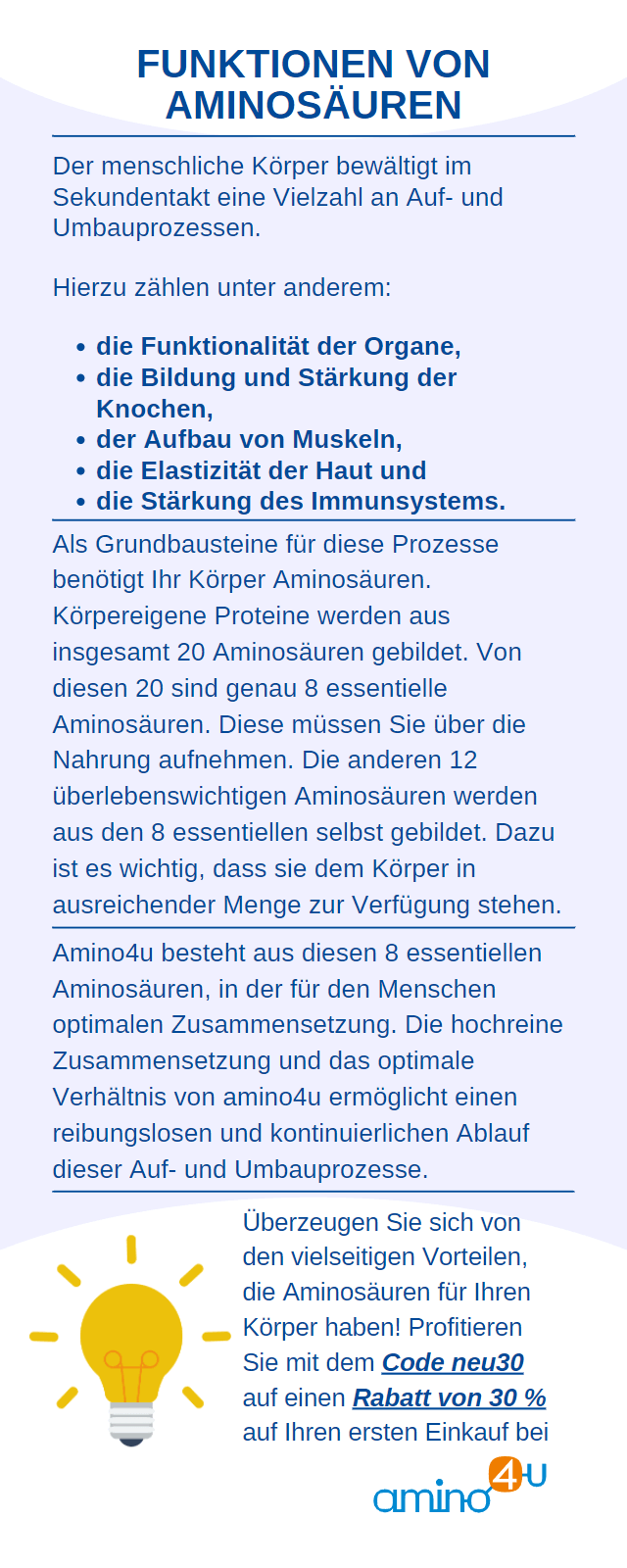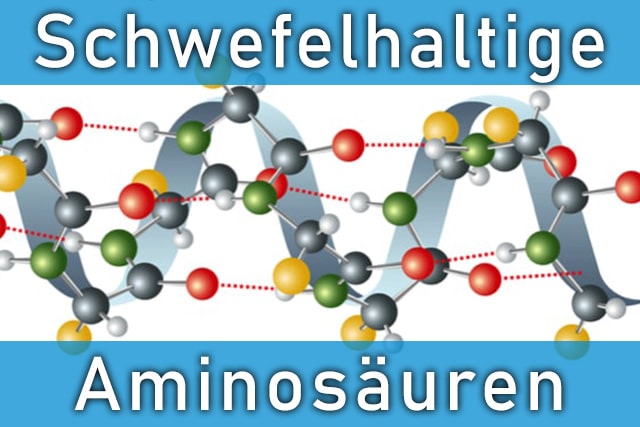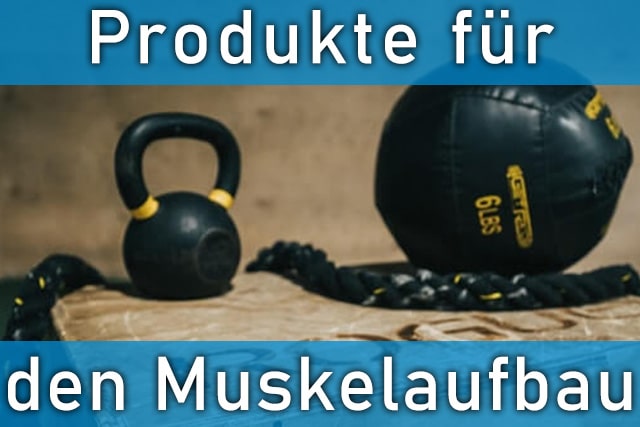Do you take amino acid supplements yourself? Do you have a horse? In this context, you may have already asked yourself whether additional protein can be good for your animal.
Find out more about the topic in the following article. The main question is whether and when a food supplement might make sense for your pet.
Amino acids and their general functions in the horse's organism
We also refer to amino acids as protein and protein building blocks, often as aminos. They form proteins and peptides in the human and horse organism by forming chains of different lengths. Protein is one of the three macronutrients for the animal, along with fats and carbohydrates.
In the mammalian organism, protein building blocks have many
different functions :
- Amino acids are also the building material for all body tissue in animals.
- Other substances such as hormones are formed from them.
-
Neurotransmitters and enzymes are often created from the conversion of protein building blocks.
For your animal, this means that muscle building in particular depends on which protein building blocks are present. This is primarily about
proteinogenic amino acids . They are called proteinogenic because the horse's organism synthesizes its own protein from them.

Essential representatives of amino acids
The horse's body cannot produce a certain type of proteinogenic building blocks itself. They must be supplied with food. In this context we speak of the essential or non-essential amino acids.
In the horse, this special group of building blocks is exposed
- Leucine
- Isoleucine
- Phenylanaline
- Methionine
- Lysine
- histidine
- Threonine
- Tryptophan
- Valine
together. 8
essential amino acids are part of our
amino4u product .

Horses and protein requirements - how much protein does your animal need?
The total protein requirement for a horse is estimated at 0.5 g to 1 g/kilogram body weight. If your animal weighs around 600 kg, it needs between 300 and 600 g of protein per day.
Stressed animals, pregnant and lactating mares and sport horses may have a higher protein requirement. Growing foals also have an increased protein requirement of 600 g in the first three years of their life.
However, when determining
protein requirements for horses, the quality of the protein is not yet taken into account. We can achieve increased protein quality, for example, by feeding the essential protein building blocks.
From the
scientific research of the American Professor Dr. Luca-Moretti came up with the idea that the essential building blocks represent a typical amino acid pattern.
The scientist assumes such a typical pattern for every mammal. It's about protein building blocks, over 99% of which can be converted into the body's own protein for the respective organism.
In the horse, the essential building blocks mentioned form this
amino acid pattern .
Luca-Moretti also assumes that the essential protein building blocks must be present in a certain quantity and quantity ratio at the same time at all times. Only then can the body be optimally supplied with protein.
Meeting needs
The animals absorb protein through their food. Protein and protein building blocks are contained in different quantities and quality in the different feedstuffs. Depending on the time of harvest, hay has a crude protein content of 8-10%. For pasture grass, this proportion can be up to 15%. These protein proportions do not say much about how well the horse can actually utilize the protein contained in the feed. We also cannot derive the exact composition of the protein with regard to the essential aminos.
The
usability of the proteins contained in hay, for example, depends, among other things, on when it is harvested.
A late harvest means that the proteins are particularly tightly enclosed in the plant's cell structures. This makes it difficult for the animals to remove it from these solid structures.

Is a deficiency in protein supply possible?
Some horse experts and veterinarians are of the opinion that protein deficiency is hardly possible if horses are fed appropriately.
They are more likely to fear an
excess of total protein.
Other experts believe that we need to pay particular attention to which protein sources we feed and in what quality. They believe that one or two amino acids may not be present in poor-quality feed. This can lead to an
amino acid deficiency .
How can you evaluate these different points of view for yourself?
The danger of an oversupply of protein
A high protein intake becomes problematic when it involves proteins that the horse cannot digest in the small intestine. Such low-quality protein leads to the formation of toxic urea. This puts a strain on the liver of the animal organism.
High-quality, good protein is synonymous with easily digestible protein. This may not be sufficiently available to the horse through its typical,
normal food sources such as hay.

If the time of harvest has an impact on the usability of the protein, other factors also play a role. Here we think e.g. B. on the composition of the feed and the individual requirements of the respective horse.
So if you are thinking about a
feed supplement with protein for your horse, please only consider high-quality
amino acid preparations . Your horse can use these well and they do not put a strain on his organism.
For which animals can feed supplements be useful?
As with human competitive athletes, the maintenance and development of muscles is important for sport horses. High-quality essential
amino acids play a key role. These are utilized particularly well by the animal organism and are available particularly quickly when food is consumed.
The
essential building blocks in particular form the horse's own protein and are therefore the basic material for building muscle. With high-quality feed supplements you can ensure that your horse gets the required amounts of essential protein building blocks.
This makes it particularly easy to assess and implement the intake of protein and protein building blocks even when there is increased demand.
You can also meet the increased need for high-quality protein in mother animals and growing foals with an
amino acid nutritional supplement .

What should you consider when choosing a high-quality feed supplement?
High-quality feed supplements usually contain the essential protein building blocks in the quantities and combinations that the animal organism needs. They are made so that the horse absorbs them happily and easily.
Premium feed supplements are standardized to certain values and may also be certified. They are made without unnecessary additives.
Please keep in mind that additives - this also applies to technical aids - can hinder protein absorption by the animal organism.
Fillers are often used to facilitate the
production of the feed supplement . They should be viewed as negative for the absorption of the corresponding nutrients.
You may also be wondering whether you should feed a specific amino acid instead of a mixture of different protein building blocks. In general, your animal is better served with a mixture, especially of the essential protein building blocks.
The use of a specific amino acid should be discussed with a veterinarian experienced in this area.
A note : In young horses that are not fed enough pasture grass and hay, a protein deficiency can generally lead to stunted growth. Even if horses feed almost exclusively on straw, a
sufficient supply of valuable, easily digestible protein is not guaranteed in the long term.
This is particularly true if the harvest was late and the feed has also been stored for a long time.
Proper nutrition for horses also includes protein supply
If you want to feed and care for your animal according to its needs, you must not lose sight of the supply of protein building blocks.
As described, the protein building blocks fulfill many different functions in the animal's organism.
The performance as well as the
maintenance and development of muscles in sport horses depends on whether the organism can access digestible proteins.
A feed supplement with essential amino acids is particularly useful here. These are particularly easy for the animal organism to utilize and are therefore a valuable basis for the body's own protein production.
When deciding for or against a feed supplement with protein building blocks, please consider
the following factors :
- Does your horse currently need more protein than usual?
- Can you already control your protein intake through high-quality food?
Not just sport horses, but also
- stressed, older and sick horses as well
- Foals and dams
need more valuable protein. Otherwise,
many bodily functions in the animal organism are at risk, not just muscle development.


 If the time of harvest has an impact on the usability of the protein, other factors also play a role. Here we think e.g. B. on the composition of the feed and the individual requirements of the respective horse.
So if you are thinking about a feed supplement with protein for your horse, please only consider high-quality amino acid preparations . Your horse can use these well and they do not put a strain on his organism.
If the time of harvest has an impact on the usability of the protein, other factors also play a role. Here we think e.g. B. on the composition of the feed and the individual requirements of the respective horse.
So if you are thinking about a feed supplement with protein for your horse, please only consider high-quality amino acid preparations . Your horse can use these well and they do not put a strain on his organism.





